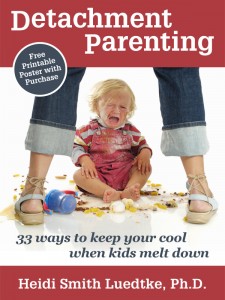
Keep calm and carry on. We see that slogan and its variations seemingly everywhere these days.
But it doesn’t necessarily come with a guidebook for parents, does it?
Well now it does. Because we parents can all-t0-easily get too wrapped up with our kids, whether that means we over-react to a minor upset or we just can’t seem to stop dancing as fast as we can to enjoy this moment.
If you can relate to any of this, I am sure you will be happy to meet expert journalist Heidi Smith Luedtke and learn about her helpful insights into using detachment parenting techniques to gain perspective and self-control when you need it most.
In addition to writing hundreds of professional articles on personal development, people skills, and parenting, Heidi is offering all her best advice in one quick read, Detachment Parenting, 33 Ways To Keep Your Cool When Kids Melt Down.
Tuesday, November 13th is Heidi’s e-book launch day and I would love your help spreading the word to frazzled parents everywhere. Thanks in advance for helping me introduce Heidi Smith Luedtke to book readers around the world.
The holidays are fast approaching and I don’t know a single parent who won’t benefit from Heidi’s insightful and inspiring tips. Welcome, Heidi!
Why Detachment Parenting? What makes you think parents are not detached enough?
Parenting is emotionally intense. We all want to give our kids a healthy, happy start in life, but even Supermom can’t prevent bad feelings from happening. Although parents know frustration and disappointment are part of life, we take it personally when kids lose it emotionally. There’s a lot of pressure to raise kids “right” and it’s hard to respond thoughtfully when your child is throwing a fit.
Parents can get sucked into kids’ bad moods without noticing. We catch their emotions just like we catch the nasty stomach bug they brought home from preschool. We feel edgy and frustrated because the kids are unhappy, so we act impatient and snap at kids verbally. This amplifies kids’ distress and makes us feel like we’ve failed as parents. The result is a negative cycle that drags everyone down.
 Will parents who follow the Attachment Parent philosophy like your advice? Or is this advice only for people who don’t follow the Attachment Parenting philosophy?
Will parents who follow the Attachment Parent philosophy like your advice? Or is this advice only for people who don’t follow the Attachment Parenting philosophy?
I’m often asked if Detachment Parenting is the opposite of Attachment Parenting. The short answer is, “No.” The detachment parenting approach is based on my belief that parents are best able to nurture their children when they are calm and responsive rather than frazzled and reactive. This e-book doesn’t prescribe parents’ choices about feeding, sleeping or cuddling with kids. It doesn’t suggest parents ignore kids’ feelings or let them cry it out when they’re upset.
Detachment Parenting simply shows you how to take an emotional step back and keep yourself centered so you can give your kids what they need. That allows parents to nurture stronger bonds with their children. Several early readers who describe themselves as adherents of the attachment parenting approach have told me they found this book extremely helpful.
Your psychology background and expert journalist experience make you uniquely qualified to write this e-book. How did all your past professional experience lead naturally up to writing this e-book?
My background is in personality and emotion. That means I have a deep understanding of how the emotion system works in your brain and your body. I’ve studied individual differences that make some people more susceptible to negative moods than other people. And I’ve also done extensive research on coping techniques: I know which strategies are effective and how to apply them in real life. In my work as a journalist, I’ve interviewed top experts to learn more about stress, anger and interpersonal dynamics. And I used all that knowledge to write Detachment Parenting.

Heidi Smith Luedtke writes for publications like Military Spouse, Parents, Pregnancy & Newborn, Costco Connection, and parenting publications around the world.
What are the benefits of reading your e-book? What strategies will I be able to apply immediately if I’m an overwhelmed mom?
The first three sections of my e-book are designed to give parents immediate relief from emotional overwhelm. “In the Heat of the Moment” offers strategies for riding out the initial wave of bad feelings so you don’t overreact and regret it later. I suggest ways to change the situation or to escape (briefly) so you can calm down. “Addressing Kids’ Concerns” shows you how to interact with kids when bad feelings flare. I describe strategies that soothe hurt feelings and teach kids to cope more effectively. “Seeing the Bigger Picture” teaches you how to shift your perspective so you see emotional patterns and can preempt most meltdowns altogether. There are 20 tips in these three sections, but you don’t have to implement all of them. If you use two or three of these detachment techniques consistently, you’ll experience a positive shift in your emotional interactions with your kids.
Are there long-term benefits, too? What bad habits do parents have that can be changed if we follow your advice?
When it comes to mood management, parents may use strategies that offer short-term relief but lead to long-term trouble. For example, parents may give in and buy kids toys or treats to avoid a meltdown in the supermarket checkout line. The next time we’re at the store, they’ll expect the same treatment. If parents don’t deliver, the tantrums get worse!
A similar dynamic happens when parents step in to solve kids’ social problems instead of helping them find their own solutions. Let’s face it: It’s easier to send kids to separate rooms when they’re fighting than it is to help them work through a disagreement. Parents may feel like it’s our job to seize control and stop the drama. But when we take charge, kids don’t learn how to handle their own problems. And they’ll expect us to intervene in every squabble.
Detachment Parenting gives parents tools and techniques for coaching kids through unhappy feelings instead of trying to avoid or eliminate them. Over time, kids get more skilled at dealing with tough situations and learn to cope independently. Parents can stop trying to control kids’ emotions and interact with their kids in supportive consulting role.
How is my life as a parent going to change for the better after I follow your advice for a while? What will kids learn from parents if we follow your advice?
If you apply my detachment parenting techniques, you’ll start to see emotional situations as opportunities to build your child’s coping and communication skills. You’ll have a short list of go-to strategies that help you stay calm and focused even when things are spinning out of control. And you’ll feel like you have more to give to your kids and your partner, because you’re taking better care of your own emotional health.
You promise the reader that your e-book will help her feel better as a person and a parent. This seems like a pretty tall order to deliver on in just 33 tips. What’s your secret?
When you create a positive emotional climate in your home and consciously teach kids the emotion-management skills they need to live well and happily, you have fewer frustrations and more fun as a parent. You’ll feel good about yourself because you know you are showing kids how to find personal happiness and interpersonal harmony. This e-book gives you a road map to both.
Learn more about Heidi’s awesome new e-book, Detachment Parenting, which is chock-full of keep-calm-and-carry-on tips at http://www.heidiluedtke.com.